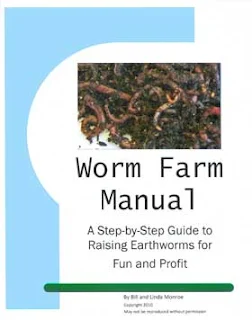- Worm Egg Capsules or Cocoons
- Worms
- Worm Castings
- Garden Culture
- Vermicompost
We've covered three of the five. Let's examine Garden Culture, an often times overlooked item that sells well locally, as well as online.
Garden Culture
Local gardeners and farmers, if they are made aware of it's benefits, make a good customer for an easy-to-package garden culture product.
What is garden culture? Simply a scoop or bag of partially decomposed worm bedding with any worm castings and worms/eggs/hatch-lings it contains. Gardeners can mix this soil amendment into their growing beds, gardens, or planting soil for improved fertility, tilth, microbes, and aeration.
Extra Profits Less Work
Because garden culture is basically scooped up, weighted, then bagged, there's much less work and time involved on your part, yet the price is good. Folks are getting several benefits all in one package - soil-improvement, fertilizer, live worms for the future - so the price you can ask is very profitable for the time and effort involved.
I would suggest you use bedding that is in mid-life - not ready for worm castings harvesting but still aged. It should be "vermi-compost" as apposed to "worm castings". It should be "organic material" rather than just the peat moss you use to ship bait worms.
Also, use bedding you've already harvested most of the larger worms and cocoons. Leave enough for a good product, but don't overload it. Moisten the bedding but don't over-wet, especially if you are shipping it. Shipping wet products can be too expensive for long distance sales.
You can also have a separate area that you use just for Garden Culture production. This will be a vermi-compost pile or bed that you add leaves, clippings, vegetables and other composting materials, then add worms to decompose the material. In this bed, you aren't interested in growing bait worms or lots of worms, so it doesn't require a lot of your attention. Just keep it watered and protected. Toss occasionally to aerate.
When you get an order, you simply mix the bed, scoop it up into bags, weight and label. Folks can pick it up, you can deliver it, or you can ship it.
When you get an order, you simply mix the bed, scoop it up into bags, weight and label. Folks can pick it up, you can deliver it, or you can ship it.
Don't bag the garden culture up too far ahead if you don't have sales. You want to keep the product fresh and viable. Sitting around in a bag for too long risks killing the worms and drying out the organic material. Incidentally, the bags you use should be "breathable" to keep the worms alive.
Add Garden Culture to your list of for-sale items and increase your worm farm profits the easy way.
Add Garden Culture to your list of for-sale items and increase your worm farm profits the easy way.
Worm Farming For Profit Information
For more worm farming information, please check out my Worm Farm Manual: A Step-by-Step Guide to Raising Earthworms for Fun and Profit. Find out other ways to increase your worm farming profits and solve problems.
If you're thinking about starting a worm farm, this guild shows you how. Avoid mistakes, save time and money, get off to a good start with this easy to understand, step-by-step guide.
Order your digital download or hard copy today.
If you're thinking about starting a worm farm, this guild shows you how. Avoid mistakes, save time and money, get off to a good start with this easy to understand, step-by-step guide.
Order your digital download or hard copy today.









